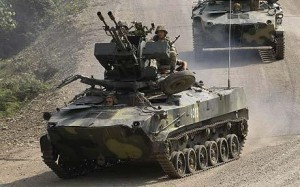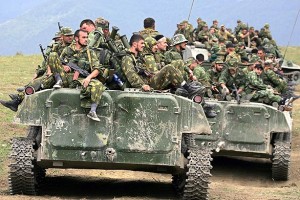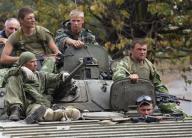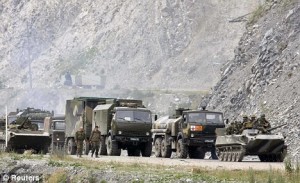The Coming War in the Caucasus
BY Herschel SmithIn It’s Time to Engage the Caucasus we described a potential logistics route through the Caucasus region in lieu of the problematic and troublesome Pakistan routes (especially through Khyber). The recommended route involved transit from the Mediterranean Sea through the Bosporus Strait in Turkey, and from there into the Black Sea. From the Black Sea the supplies would go through Georgia to neighboring Azerbaijan. From here the supplies would transit across the Caspian Sea to Turkmenistan, and from there South to Afghanistan.
In addition to this region being a potential viable alternative to Pakistan, we noted this region as being an up-and-coming economic power due in part to the massive quantities of energy buried beneath its soil. The engagement of the Caucasus region would potentially lead not only to logistics routes, but political and energy partnership as well. But the darker truth that accompanies this potential is that Russia is also interested.
Russia is interest for several reasons, including the fact that Russian bases in Armenia have no viable land resupply and logistics route except through Georgia. Recent NATO exercises in Georgia infuriated the Russian administration, causing the Russian ambassador to say that “Differences between Russia and U.S. on a number of issues still persist. The most recent example is NATO maneuvers in Georgia. It disappoints us as it assures Georgian government that regardless of what it did towards Russia, it will gain NATO membership. Unfortunately, no lesson was drawn from August events,” referring to their 2008 invasion of Georgia.
This is the first admission of the real reason behind the invasion of Georgia, veiled though it was. It was all about “lessons” for the U.S. and Georgia. The most recent warnings are less veiled.
A Kremlin policy paper says international relations will be shaped by battles over energy resources, which may trigger military conflicts on Russia’s borders.
The National Security Strategy also said that Russia will seek an equal “partnership” with the United States, but named U.S. missile defense plans in Europe among top threats to the national security.
The document, which has been signed by President Dmitry Medvedev, listed top challenges to national security and outlined government priorities through 2020.
“The international policy in the long run will be focused on getting hold of energy sources, including in the Middle East, the Barents Sea shelf and other Arctic regions, the Caspian and Central Asia,” said the strategy paper that was posted on the presidential Security Council’s Web site.
“Amid competitive struggle for resources, attempts to use military force to solve emerging problems can’t be excluded,” it added. “The existing balance of forces near the borders of the Russian Federation and its allies can be violated.”
Medvedev’s predecessor Vladimir Putin, who is now Russia’s powerful prime minister, often accused the West in the past of trying to expand its clout in the ex-Soviet nations and push Russia out of its traditional sphere of influence. The Kremlin has fiercely opposed NATO’s plans to incorporate its ex-Soviet neighbors, Ukraine and Georgia.
Russia currently controls most natural gas export routes out of the former Soviet region, but that grip is coming under growing pressure from China and the West.
The European Union, which depends on Russia for about one-quarter of its gas needs, has sought alternate supply routes, including the prospective Nabucco pipeline that would carry the Caspian and Central Asian gas to Europe but skirt Russia.
Intensifying rivalry for influence in the ex-Soviet region fomented tensions and helped stage the ground for last August’s war between Russia and Georgia, which sits astride a key export pipeline carrying Caspian oil to Western markets.
The war erupted when the U.S.-allied Georgian President Mikhail Saakashvili sent troops to regain control over the separatist province of South Ossetia, which had close links with Russia. After routing the Georgian army in five days of fighting, Russia recognized both South Ossetia and another Georgian rebel province of Abkhazia as independent nations and permanently stationed nearly 8,000 troops there.
President Barack Obama’s administration has sought to rebuild ties with Moscow, which plummeted to a post-Cold War low under his predecessor and focus on negotiating a new nuclear arms control deal. Medvedev and other Russian officials have hailed what they called the new administration’s constructive approach and voiced hope that Washington will drop plans to deploy missile defense sites in Poland and the Czech Republic — a top irritant in U.S.-Russian relations.
Reflecting the Kremlin’s hope for better ties with Washington, the strategy paper said Russia will seek “equal and full-fledged strategic partnership with the United States on the basis of coinciding interests.”
But it warned that missile defense plans and prospects to develop space-based weapons remain a top threat to Russia’s security, and said Russia will seek to maintain a nuclear parity with the United States. However, it added that Russia’s policy will be pragmatic and will exclude a new arms race.
The Captain’s Journal has recommended engaging the Caucasus by means of friendship, assistance and special dispensation for business partnerships. This remarkable admission by Russia, signed by Medvedev, directly admits that war is possible over energy.
The romantic notions of influence in its so-called near abroad has been dropped in favor of more honest but crass verbal bullying and threats, targeted at an administration which wants to press the “reset” button with them. The team of Putin and Medvedev intend to bloat the cash flow directly into Russia in payment for energy, this very energy being extorted by force if necessary.
Given the predisposition of the current administration to negotiate, talk, bargain and expect only the best of our supposedly erstwhile enemies, it isn’t apparent that Georgia, the Ukraine and other regional countries have any hope of continued sovereignty as it currently exists. If extortion and threats don’t pave the way towards a re-emergence of the old Soviet style government, then they have made their only other option clear. War is coming to the Caucasus.
Prior:
Obama, Russia and the Future of Georgia












